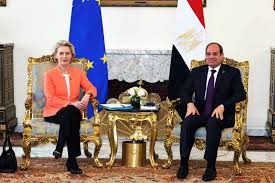EU and Egypt to sign 7.4 bn euro funding package: official

Cairo: The European Union, which is seeking to stem the inflow of irregular migrants, announced Sunday a 7.4 billion euro ($8 billion) package of loans, grants and energy cooperation deals with cash-strapped Egypt.
It will include billions in loans over coming years and aims to step up Egyptian energy imports to help Europe “move further away from Russian gas” amid the Ukraine war, a senior European Commission official told reporters.
EU chief Ursula von der Leyen — who was expected in Cairo, joined by the leaders of Austria, Belgium, Cyprus, Greece and Italy — was to sign the deals later in the day with Egyptian President Abdel Fattah al-Sisi.
Egypt, mired in economic crisis, borders war-battered Libya and two ongoing conflicts — the Israel-Hamas war in the Gaza Strip, and Sudan’s war between the regular armed forces and the paramilitary Rapid Support Forces.
“Egypt is a critical country for Europe today and for the days to come”, said the commission official, who asked not to be named, and who pointed to Egypt’s “important position in a very difficult neighbourhood, bordering Libya, Sudan and the Gaza Strip”.
Egypt already hosts around nine million migrants and refugees, including four million Sudanese and 1.5 million Syrians, according to the UN’s International Organization for Migration.
The EU official said the deal includes steps on “security, counter-terrorism cooperation and protection of borders, in particular the southern one” with Sudan.
The agreement follows other controversial deals the EU has sealed with Libya, Tunisia and Mauritania to stem the flow of irregular migrants across the Mediterranean Sea.
They aim to limit arrivals at a time of rising anti-immigrant rhetoric in Europe and the growth of right-wing populist political parties in several EU nations.
The group Human Rights Watch said it had documented “arbitrary arrests and mistreatment of migrants, asylum seekers and refugees by Egyptian authorities”.
HRW also again criticised what it labelled “the EU’s cash-for-migration-control approach” which it said, “strengthens authoritarian rulers while betraying human rights defenders, journalists, lawyers and activists whose work involves great personal risk”.
Highly indebted Egypt, the Arab world’s most populous nation, is in dire need of financial help as it weathers a severe economic crisis marked by rapid inflation.
The International Monetary Fund this month agreed an $8 billion loan package after Cairo implemented a flexible exchange rate and raised interest rates.
The agreement with the EU includes five billion euros in loans, 1.8 billion euros in investments and hundreds of millions for bilateral projects including on migration.
Egypt’s economy, dominated by military-linked enterprises and focused on expensive infrastructure mega-projects, has been hit hard by a series of recent economic shocks.
Among them have been the Covid pandemic’s impact on tourism, higher food prices amid the Ukraine war, and attacks by Yemen’s Houthi rebels on Red Sea shipping that have slashed Suez Canal revenues.
Egypt’s external debt has ballooned to $164.7 billion, and the cost of servicing it is expected to reach $42 billion this year.





